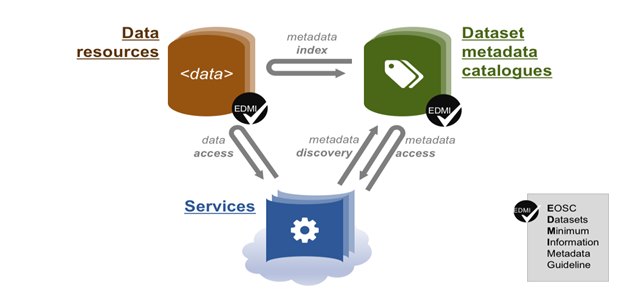There are many different catalogues for different purposes, covering different user needs, and collecting metadata at different levels. The EOSC should support an ecosystem of metadata catalogues consistently with a sustainable and coordinated strategy to provide users with a better service to find and access data.
Metadata catalogues need to provide sufficient metadata, in compliance with minimum requirements from EOSC users and services as described by the EDMI metadata guidelines.

Picture 2. Dataset metadata catalogues and the EDMI metadata guideline as major components of the data interoperability architecture. The metadata catalogues index metadata from 3rd party data resources. Each metadata catalogue recommends the best way for each resource to provide metadata to the catalogue, and can chose to make these recommendations compliant with EDMI. Services to find datasets will be able to use the programmatic interfaces exposed by the catalogues. If the metadata provided by the catalogue is compliant with the EDMI guidelines, the services will know they will have enough information to find and access datasets from third party resources.
Better coordination among existing dataset metadata catalogues requires support for: metadata registration and metadata exchange.
To help users, services, data resources and metadata catalogues to find metadata catalogues (to use, import or submit dataset metadata) we recommend the use of a catalogue of data resources and catalogues like FAIRsharing. FAIRsharing it is participating in a demonstrator to help find data resources and catalogues compliant with the EDMI guidelines.
